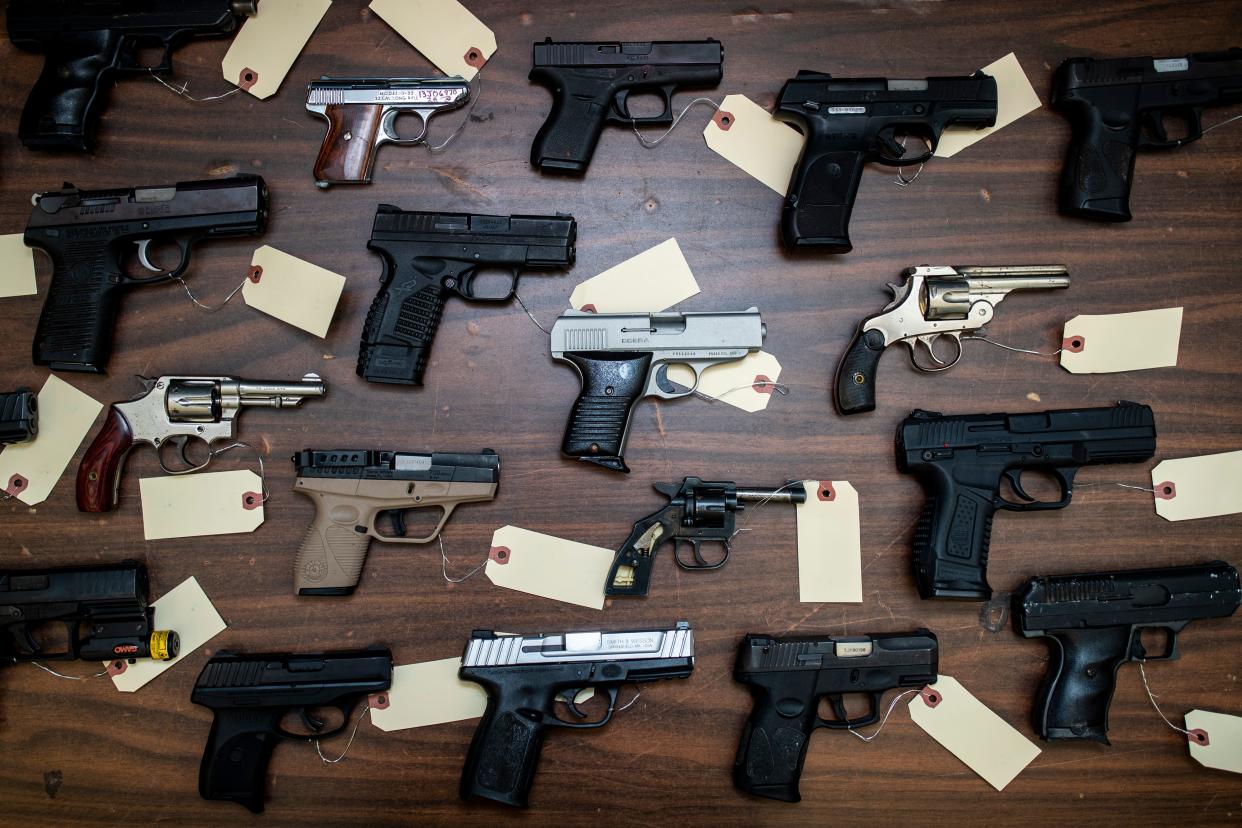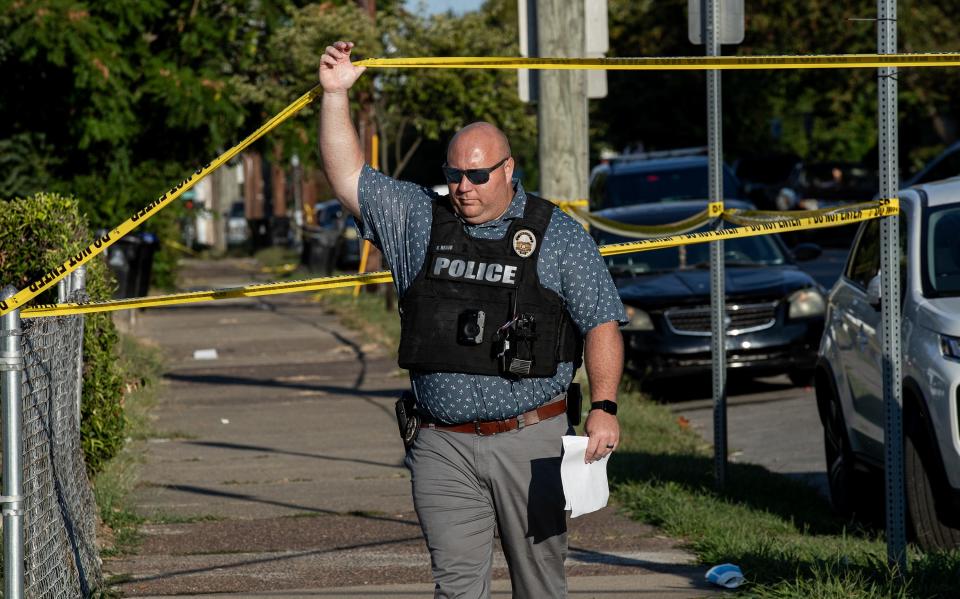How would the Safer Kentucky Act really impact Louisville? Lawmakers, advocates at odds

The Safer Kentucky Act makes big, sweeping promises — from creating a new crime to installing a version of the long-controversial "three strikes" law for violent offenders — but the question on the minds of many living in the state's largest city remains: Would it make Louisville safer?
That answer depends on who you ask. Last week, Jared Bauman, a Louisville Republican in the Kentucky House of Representatives, told a packed room of supporters and critics in the Capitol Annex that the bill introduces critical reforms to Kentucky's justice system and "focuses on accountability for serious criminal behavior." Louisville Metro Councilwoman Shameka Parrish-Wright told that same crowd the plan criminalizes poverty and would only add to the state's incarceration problem.
"There is broad consensus that Louisville has a serious violent crime problem," Mayor Craig Greenberg told The Courier Journal. "There is less consensus on how to effectively solve that problem."
For the third consecutive year, Louisville has experienced homicide totals in the triple digits, with Greenberg recently calling on state legislators for help curbing the city's gun violence.
While the bill would make changes for all of Kentucky, the plan's key sponsors — Bauman and fellow Republican Rep. Jason Nemes of Middletown — along with some of its staunchest critics hail from the Louisville area.
"Both being representatives from Louisville, we definitely deeply understand the impact and fear and terror that crime in our city is having on all of our constituents," Bauman told fellow Rep. Keturah Herron, D-Louisville, during a Jan. 18 House Judiciary committee meeting.
In its 72 pages, House Bill 5 has provisions ranging from allowing shopkeepers to use force against believed theft and criminalizing camping in parks and sidewalks. If the bill continues its steady journey toward Gov. Andy Beshear's desk to be signed into law, here's which changes could have the biggest impact in Louisville:
How would the plan help — or hurt — Louisville's gun violence?
The proposal has a few provisions that would change gun laws in Kentucky — though some lawmakers disagree on whether it would make Louisville's streets safer or open more people up to violence.
During the Judiciary committee meeting last week, Rep. Nima Kulkarni, D-Louisville, took issue with one of the bill's most controversial provisions, which would allow business owners to use force to prevent people suspected of shoplifting from escaping.
Kulkarni says the allowed use of "force" is too vague and would open the state up to unintended consequences.
"This (bill) doesn't do anything to address gun violence, it doesn't do anything to keep guns out of the hands of the people that shouldn't have them," Kulkarni said. "So my question to you is — as it is also a permitless concealed carry state, we do not do background checks — what is your reasoning and how do you anticipate preventing a shop owner who suspects somebody of stealing a bag of chips from shooting them and having zero criminal or civil liability for having done so?"
The bill also would allow a person who owns or leases a property to use force against an individual illegally camping there if the individual either has used force or threatened to use force against the property owner or resident. This would primarily impact the state's unhoused population, said Catherine McGeeney, director of communications for Louisville's Coalition for the Homeless.
People without shelter are far more likely to be the victims of violence than housed people are, McGeeney said.
"We take issue both with the insinuation that unsheltered or unhoused people are inherently dangerous, and we're really concerned that a person in crisis, rather than being met with tried and true best practice de-escalation tactics, that someone would feel authorized and emboldened to shoot them or kill them," McGeeney said. "That's simply alarming."
Bauman and Nemes said the liability of a person's action and whether the amount of force used was justified would be determined in a civil or criminal trial by a judge or jury.
The bill also includes a longstanding request by Greenberg to take guns used in homicides off the streets.
Guns confiscated by Louisville Metro Police are required to be auctioned by Kentucky State Police. But Greenberg has said he would like LMPD to be able to destroy guns "seized by police that were used to injure or kill people in Louisville."
The bill would allow guns used in a homicide to be destroyed, but it would still be auctioned and the winning bidder would have to agree beforehand to leave it with KSP.
The Safer Kentucky Act also would create a new crime by classifying carjacking as a Class B felony, which carries a sentence of 10-20 years in prison. Carjacking is currently charged as first-degree robbery, with Rep. Emily Callaway, R-Louisville, saying that having a separate charge would help track offenses.
This provision is also supported by Greenberg, though he also mentioned he'd like to see the General Assembly go further in helping Louisville.
"We need more focus on measures that prevent violent crime and keep guns out of the wrong hands, including new resources for LMPD and local autonomy so that we can address our specific urban crime challenges," Greenberg said.

Does Safer Kentucky Act go too far, or not far enough?
The Safer Kentucky Act is hard on crime — it strengthens sentencing laws, including life in prison for those found guilty of three separate violent felonies; it puts the death penalty on the table for those convicted of murdering a police officer or other first responder; and it introduces tougher penalties for people convicted of fentanyl trafficking.
But tougher penalties and longer sentences would lead to more incarceration across Kentucky, which Rep. Herron has openly criticized.
"Unfortunately, I do not think that this bill is going to make us safer, and there are several reasons why I say that," Herron said. "But one of the biggest things is that at no time in the state of Kentucky or in our nation have we been able to incarcerate ourselves out of any issue ever."
Bauman pushed back against Herron's critiques at the Judiciary committee meeting, saying he had data that showed increasing incarceration of violent offenders "will absolutely, unequivocally lead to safer communities and less crime."
In an exchange that bordered on contentious, Herron said she and another lawmaker had asked to be given those studies in December but have not yet received them.
But Nemes, one of 52 co-sponsors of the bill, said the proposal doesn't go far enough, saying he thinks those found guilty of two separate violent felonies should be given life in prison.
According to Nemes, some provisions were included after the bill's sponsors spoke with various stakeholders across the state, including Louisville Metro Police.
"We know, when we talked to LMPD, that the spike in the Louisville violent crime has to do with minors," Nemes said. "One of the things that we have in this bill is we're cracking down on adults who use minors for their crimes."
Under this bill, any adult who engages in a criminal conspiracy with a minor would be charged one level higher than the level provided for the offense.
When asked whether LMPD supports the Safer Kentucky Act, spokesman John Bradley responded with a statement to be attributed to the department:
“LMPD’s priority is to prevent and reduce violent crime in Louisville and the department is encouraged to see the General Assembly focused on addressing public safety. We are following this proposed legislation closely in hopes it will ensure our officers, investigators and prosecutors have the tools needed to more effectively fight violent crime and make Louisville a safer place to call home.”
Critic: Plan would 'criminalize' being homeless in Louisville
The bill's provisions that would impact the state's unhoused population has triggered some of the most contentious debates.
The bill bans street camping while allowing local governments to designate temporary camping locations. This means that people could be arrested for sleeping or setting up camp in a public or private street, sidewalk, area under a bridge or underpass, a path or park.
This would pose a huge problem for Louisville, McGeeney said.
Nearly 4,000 people in the state experience homelessness on a given night, according to the National Alliance to End Homelessness, with the highest rates in Louisville and Lexington. As counted on a week in mid-January last year, there was a total of 1,605 people who were either in a homeless shelter or were on the streets of Louisville. About 580 of them were sleeping or camping outside.
McGeeney said Louisville's unhoused population outnumbers the amount of shelter beds or affordable housing initiatives.
Rep. Steven Doan, R-Erlanger, also noted Kentucky does not have a homeless shelter in every county, which could leave people with nowhere to stay if this ban was implemented.
It's also unclear whether this ban could be enforced, as the U.S. Supreme Court is set to weigh in on whether cities can legally ban or limit unhoused people camping in public spaces.
McGeeney said she hopes advocates for those experiencing homelessness can work with lawmakers and find better solutions.
"We are always willing to work with officials and leaders to brainstorm on real solutions to the problem. There's no part of us that believes there's not a problem here. We know that there's a problem," McGeeney said. "But we are just as confident in saying that criminalization (is) … not the answer that will not solve the problem. It will make it worse."
Reach reporter Rachel Smith at rksmith@courierjournal.com or @RachelSmithNews on X, formerly known as Twitter.
This article originally appeared on Louisville Courier Journal: Safer Kentucky Act's real impact on Louisville debated

